
THE VOICE OF INTERNATIONAL LITHUANIA
|
VilNews has its own Google archive! Type a word in the above search box to find any article.
You can also follow us on Facebook. We have two different pages. Click to open and join.
|
News

Kazakhstan's Ambassador to Lithuania Galymjan Koyshibayev arrived in Lithuanian railway station Kena to attend the meeting ceremony of container train Saule that moves from China to European biggest port in Belgium's Antwerpen via the territory of Lithuania, the Kazakh Foreign Ministry reported today.
"The Saule train, the first of such kind, carrying 41 containers with computer software on a full-length 11,000-kilometer route departed from China's Chun Zin on October 28 to move via the territories of Kazakhstan, Russia, and Belarus toward Lithuania and onward to Belgium via Poland and Germany," the report reads.
The train reached Lithuania within a very short period of time - 13 days - after it moved from China via Kazakhstan, Russia, and Belarus, Koyshibayev said. His Chinese counterpart Tong Mingtao said the train Saule is the result of multiyear cooperation and that its arrival in Lithuania marks the beginning of a new era in the field of transportation as it is expected to improve achievements of the transport sectors of all countries concerned.
At the sidelines of Lithuanian President Dalya Gribauskaite's official visit to Kazakhstan in the early October 2011, the heads of the two states agreed to launch train Saule before the end of the year. The Saule train project promises to bring benefits not only economically as railway communication is one of ecologically cleanest kinds of transport.
Implementation of the project is expected to provide further development of "the green" transport linking Europe to Asia.
Read more:
http://en.trend.az/regions/casia/kazakhstan/1956071.html
- Bookmark :
- Digg
- del.icio.us
- Stumbleupon
- Redit it
DnB NORD becomes DNB 11.11.2011 at 11:00
- Posted by - (0) Comment
![]()
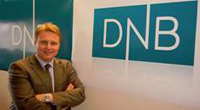
Communication Director Trond Bentestuen at DNB in Norway with the new logo. Development price for the logo has been around LTL 7 millions.
Photo: DnB Nor.
The new name emphasizes that the former DnB NORD now is an integrated part of Norway’s biggest bank, which provides its services in 19 countries worldwide. All the banks and subsidiary companies of the Norwegian financial services group DnB NOR will be included under the DNB brand as part of a worldwide rebranding effort. DNB stands for Den Norske Bank, meaning the Norwegian bank.
The new legal names of the bank and its subsidiary companies as of 11 November 2011:
- AB DNB Bankas (formerly AB DnB NORD Bankas)
- UAB DNB Investicijų valdymas (formerly UAB DnB NORD Investicijų valdymas)
- UAB DNB Būstas (formerly UAB DnB NORD Būstas)
- AB DNB Lizingas (formerly AB DnB NORD Lizingas)
For additional information please visit the bank’s new web page www.dnb.lt.
- Bookmark :
- Digg
- del.icio.us
- Stumbleupon
- Redit it
Not all EU reforms favorable to the Baltics
- Posted by - (0) Comment
![]() Nov 10, 2011
Nov 10, 2011
Baltic Times Interview
by Linas Jegelevicius
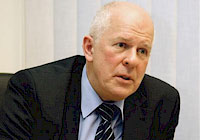
While EU strategists scramble to look for new ways to communicate about Europe, Algirdas Saudargas, member of the European Parliament, a Conservative and one of the builders of the Lithuanian Motherland Union, as well as the former minister of Lithuania’s Foreign Affairs from 1990-1992 and 1996-2000, delivers the “European message” to his constituents in his own way – publishing the center-right magazine, Apzvalga (Review), bringing European policies and national issues just a bit closer to everyone. The MEP, who is also a signatory of the 1990 Lithuanian Independence Act, agreed to answer The Baltic Times questions.
Read the interview here:
http://www.baltictimes.com/news/articles/29968/
- Bookmark :
- Digg
- del.icio.us
- Stumbleupon
- Redit it
Siauliai mulls honouring Reagan with airport
- Posted by - (0) Comment
![]()

Ronald Reagan holding a Lithuanian ‘juosta’ that says “I Love Lithuanians”.
Photo courtesy of Rima Jasiukonis Raulinaitis, California.
Officials in the Lithuanian city of Siauliai say they will discuss renaming a former Soviet strategic air field in honor of Ronald Reagan.
The idea to name Siauliai International Airport in honor of the late U.S. president came from Lithuania’s parliamentary foreign affairs committee, which recently voted in favor of the move.
Reagan is extremely popular in Eastern Europe due to his tough stances during the Cold War confrontation with the Soviet Union, which he dubbed the “evil empire.’’ He is also credited with fostering the spread of democracy in the region.
- Bookmark :
- Digg
- del.icio.us
- Stumbleupon
- Redit it
Gintaré performs in North Ireland next Saturday
- Posted by - (0) Comment
![]()

Gintaré will offer an evening of original music influenced by classical, jazz, New Age and pop at Camden's John Street United Methodist Church Saturday, Nov. 19.
CAMDEN, NORTH IRELAND — Music is magic for Gintaré, and she is ready to begin sharing it again with her community and the world.
Gintaré McCurdy has performing under her first name since she was a girl, evolving from a classical trained musician to a teen pop star in her native Lithuania and later spending time in England, where she worked with late Elton John producer Gus Dudgeon to produce a 2000 album that appeared on international pop music charts and became a dance club hit in London.
Read more:
http://waldo.villagesoup.com/ae/story/sharing-the-magic/466912
- Bookmark :
- Digg
- del.icio.us
- Stumbleupon
- Redit it
Russian planes spark NATO scramble in Lithuania
- Posted by - (0) Comment
![]()

Last Monday two Russian AN26 transport aircrafts and a TU134 bomber flew in succession from Kaliningrad to Russia itself, and an IL20 intelligence-gathering plane flew in the opposite direction.
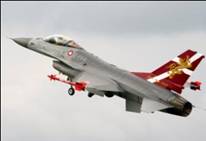
Four Danish F-16 fighters, which currently police the skies of Lithuania, Latvia and Estonia, took to the air twice to escort the Russian planes.
NATO jets were scrambled Monday as four Russian air force planes flew near the territory of the Baltic states,
Lithuania's defence ministry said, adding that the unusual number was a cause for concern, AFP reported.
Defence ministry spokeswoman Ugne Naujokaityte said that four Danish F-16 fighters, which currently police the skies of Lithuania, Latvia and Estonia, took to the air twice to escort the Russian planes.
Two AN26 transport aircraft and a TU134 bomber flew in succession from Russia's Baltic territory of Kaliningrad to Russia itself, and an IL20 intelligence-gathering plane flew in the opposite direction.
While their path over neutral waters did not ultimately encroach on the Baltic states' airspace, the flurry of flights was unusual in an area that normally sees only a few Russian aircraft transit every few weeks.
"The intensity of these Russian planes' flights raises concern. It proves once again the importance and necessity of the NATO air police mission in Baltic states," Naujokaityte said.
The Baltic states broke away from the crumbling Soviet Union in 1991 after five decades of communist rule and joined NATO in 2004.
- Bookmark :
- Digg
- del.icio.us
- Stumbleupon
- Redit it
Since their peak in December 2007 apartment prices in Vilnius have fallen by 39.1%
- Posted by - (0) Comment
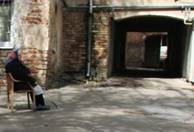
Apartment prices in the main cities in the Baltics are stable with Tallinn showing a surge in prices and sales last month, according to the latest Ober-Haus Baltic Apartment Price Index.
After a 0.1% increase in August prices of apartment in Vilnius remained stable in September at €1,209 per square meter. It means that year on year prices has decreased by 2.4%.
Sales activity in the region’s housing market normally increases in autumn but there is no sign of that happening in September as no major changes in apartment prices were seen in any major Lithuanian city.
Since their peak in December 2007 apartment prices in Vilnius have fallen by 39.1%.
Read more:
http://www.propertywire.com/news/europe/baltic-poland-property-prices-201110195697.html
- Bookmark :
- Digg
- del.icio.us
- Stumbleupon
- Redit it
- Posted by - (0) Comment
Vilnius Airport:
53.7% increase in passenger traffic

Watch the air traffic over Lithuania.
Vilnius International Airport (VIA) ended this year’s aviation summer season with excellent results: passenger traffic in October grew by 53.7% compared to the same period last year. Passenger traffic of the second month of autumn reached the most successful results of the same period of activity of 2008.
“This year’s autumn brought very satisfactory results and this fact once again proves that Vilnius International Airport has been implementing a purposeful strategy and chose the right flight geography development”, Minister of Transport and Communications Eligijus Masiulis summarized the activity results of the VIA.
In October Vilnius International Airport provided services for 168.2 thousand passengers and performed 2477 flights the number of which grew by 18%. In October the most popular destinations included London, Frankfurt, Copenhagen, Helsinki, Milan and Dublin. Last month the highest number of passengers was serviced by airlines Lufthansa, Scandinavian airlines, Finnair, Wizzair, Ryanair and AirBaltic.
“Our aim for the aviation winter season is to maintain the growth rate of 30% developed during the summer season by ensuring the best result in the history of our activity”, said Director General of VIA Tomas Vaišvila.
The number of flights provided in the current flight schedule for the winter season grew by more than one third compared to the winter season last year. During the winter season of 2010–2011 VIA performed flights for 19 routes, while for the same period in 2011–2012 it has been planned to increase the number of regular flights routes up to 27.
- Bookmark :
- Digg
- del.icio.us
- Stumbleupon
- Redit it
Lithuania eyes sixfold jump in state firm returns
- Posted by - (0) Comment
![]()

By Nerijus Adomaitis, Reuters
Lithuania has embarked on reform of its state-owned enterprises, and wants them to generate a sixfold rise in dividends to 540 million litas (156 million euros) next year, representing 0.5 percent of its GDP.
Along with austerity measures and tax increases, the reforms are part of fiscal consolidation aimed at cutting the Baltic state's deficit, which surged to 9.5 percent of gross domestic product in 2009 after an economic contraction of nearly 15 percent the same year.
TARGETS: Instead of privatization, Lithuania's coalition government wants to extract higher returns from its biggest state-owned firms, which operate in the energy, forestry and transport sectors. These companies had a total estimated market value of 21 billion litas in 2010.
Despite a still fragile economy, returns generated by Lithuanian state firms have grown in recent years. In 2009, the net turnover for the state-owned firms amounted to 6.5 billion litas with a mere 42 million litas in dividends.
Higher contributions from state assets that include utility and railway operators doubled dividends this year to 86.2 million litas from 2010.
PROGRESS:
Lithuania, which aims to adopt the euro in 2014, also wants to improve corporate governance and limit political influence on management by including independent professional managers in the boards of these companies.
In October, majority state-owned oil terminal Klaipedos Nafta elected two independent members, including a representatives from a life insurance fund, to its board.
State-owned companies are now expected to report their performance quarterly and annually while the economy ministry has started issuing regular reviews of key sectors.
The government has also ordered an audit of the social role of these companies to uncover, for instance, the cost of operating loss-making railway routes. The aim is to eventually separate the commercial and social functions of these firms.
Political opposition has already thwarted the government's attempt to place all its state-owned assets under a single holding company.
(3.4527 litas = 1 euro)
- Bookmark :
- Digg
- del.icio.us
- Stumbleupon
- Redit it
- Posted by - (0) Comment
Big in the Baltics
With an abundance of raw materials and easy access to export markets, Estonia, Latvia and Lithuania are major league players in wood pellet production.
By Peter Taberner | October 31, 2011
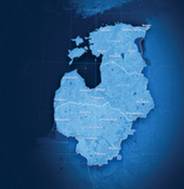
In this not-so-talked-about part of Northeast Europe, the Baltic states—Latvia, Estonia and Lithuania—almost secretly possess a successful and burgeoning wood pellet industry, exporting to many major European pellet markets.
“The ever-growing level of production capacity in the Baltic region was the key reason we decided at Argus to put together our weekly fob (free on board) Baltic index for spot deals,” says Brodie Govan, editor of Argus Biomass Markets. “The Baltics have become one of the major supply hubs in the wood pellet sector, along with Portugal in Europe and the West Coast of Canada and Southeast U.S. The region has long been considered a reliable exporter to end-users in Scandinavia but that reputation is changing as more buyers from mainland Europe sign up for supply deals.”
Brodie estimates the Baltic’s current wood pellet production capacity at about 1.3 million metric tons per year. Latvia leads the way with 800,000 metric tons per year, Estonia at 450,000 metric tons and Lithuania at 120,000.
Read more:
http://biomassmagazine.com/articles/5909/big-in-the-baltics/
- Bookmark :
- Digg
- del.icio.us
- Stumbleupon
- Redit it
- Posted by - (0) Comment

Lithuania will exhibit at World Travel Market (WTM) at Excel London (stand number EM 270), 7-10 November 2011, marking the fifth anniversary of the Lithuanian Tourist Board being established in the UK and what has been the destination’s most successful year yet.
Interest in the destination rocketed in 2011, thanks to Lithuania’s State Department of Tourism hosting the AITO and AITO Agents’ overseas conference in Vilnius in June, as well as the global success of that famous You Tube video of the Mayor of Vilnius using a tank to crush a luxury car illegally parked in a cycle lane to campaign for greater eco awareness.
Dr Raimonda Balniene, Director of the Lithuanian State Department of Tourism, says: “Lithuania has seen a tremendous growth in incoming tourism this year – a rise of 25% in the first half of 2011 (770,000 visitors in total from around the world) compared with 2010. This includes the number of UK visitors rising by 12.6% in the first half of 2011 compared with 2010.
“We’re delighted to be exhibiting once again at WTM, to reinforce to the travel industry what makes Lithuania such a fascinating place to visit. It’s a wonderfully diverse destination, from the Baroque and Gothic architecture of Vilnius to the country’s stunning forests, lakes, coastline and castles, not forgetting its exquisite cuisine.
“We’ll be revealing the latest news and inspirational holiday ideas to be found in the country at WTM and are particularly excited to have the Mayor of Vilnius on our exhibition stand.”
- Bookmark :
- Digg
- del.icio.us
- Stumbleupon
- Redit it
Lithuania faces legal action over prisons set up for CIA rendition programme
- Posted by - (0) Comment
![]() Lawyers acting for detained militant Abu Zubaydah have begun proceedings in the European court of human rights.
Lawyers acting for detained militant Abu Zubaydah have begun proceedings in the European court of human rights.
![]()
The Lithuanian government is facing legal action in the European court of human rights over secret prisons that the CIA established in the country as part of its worldwide "extraordinary rendition" programme.
It becomes the third European government to face proceedings as a result of its support for the agency's operations, Macedonia and Poland having already been accused of breaches of the European convention on human rights.
The Lithuanian parliament has acknowledged that the CIA established two prisons with the help of the country's own security service, the SSD. One was at a riding school in a village 12 miles north of the capital, Vilnius, while the second is thought to have been at a guest house in Vlinius. The parliamentary report failed, however, to establish whether any prisoners had been held at the sites.
Lawyers representing the militant known as Abu Zubaydah say he was detained in Lithuania, and they began court proceedings in Strasbourg on Thursday. They allege that the Lithuanian government is guilty of multiple breaches of the European convention on human rights, first by allowing the CIA to fly Abu Zubaydah to the country and detain him in one of the secret prisons, and then by failing to investigate the matter itself.
- Bookmark :
- Digg
- del.icio.us
- Stumbleupon
- Redit it
Lithuania welcomes EU’s last ditch deal, saying the resolve finally showed by EU heavyweights should stop the debt crisis from spreading
- Posted by - (1) Comment
![]()

Angela Merkel and
Dalia Grybauskiate
Lithuania Thursday welcomed a last-ditch deal to shore up the currency bloc, saying the resolve finally showed by EU heavyweights should stop the debt crisis from spreading.
"We've witnessed much more resolve from major EU countries," Prime Minister Andrius Kubilius said in a radio interview.
"Now we see much more political effort to find solutions to problems that have not been solved for almost one and a half years," he added.
Leaders from the 17-nation eurozone meeting overnight in Brussels reached a deal early Thursday to fix their festering debt crisis, boosting a bailout fund to a trillion euros, pledging new money for Greece and pushing banks to take a 50-percent loss, or "haircut", on Greek debt.
They acted amid raging concerns that the crisis could spiral, with Italy in the spotlight.
Lithuania's President Dalia Grybauskaite -- who attended Wednesday's summit of all 27 EUnion members held before the eurozone talks -- said she expected the deal to provide a buffer.
"These decisions, if implemented swiftly, are very useful, as the problems will be stopped in southern Europe and will not spread north," Grybauskaite, the EU's former finance commissioner, told the Baltic News Service.
Lithuania aims to adopt the euro by 2014.
- Bookmark :
- Digg
- del.icio.us
- Stumbleupon
- Redit it
- Posted by - (1) Comment
Good news for Lithuania!
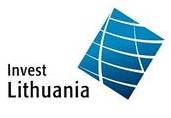
1) Now ranked ahead of France and Belgium

Lithuania is ranked 27th out of 183 countries in the global business environment ranking "Doing Business 2012" recently published by The World Bank.
Lithuania is ranked higher than Belgium, France, the Netherlands, Luxembourg, Spain, Greece, Austria and Italy.
Lithuania has been rated particularly high in the Property Registration category (7) and the Contract Enforcement category (15).
Moreover, Lithuania has stepped even by 28 positions up to the 65th rank in the Protecting Investors category. It has been also noted in the report that Lithuania facilitated tax administration over the year as well as improved conditions for trade across borders by reducing the time spent at customs.
- Bookmark :
- Digg
- del.icio.us
- Stumbleupon
- Redit it
2) Baltic States growing quickest in the EU
- Posted by - (0) Comment
![]()

In its recent Eurozone forecast produced in cooperation with Oxford Economics, Ernst & Young says that in the second quarter (Q2) of 2011 three Baltic economies grew most in the EU: Lithuanian gross domestic product (GDP) grew by 6.3 percent, Estonia posted growth of 8.4 percent, and Latvia's economic output increased by 5.7 percent.
Lithuania's Q2 GDP growth only proved the trends of recovery in country’s manufacturing industry, Ernst & Young says. In June, new industrial orders went up by as much as 5.6 percent, which raised the annual growth rate to 28.4 percent, the biggest growth in the EU.
Ernst & Young predicts that Lithuanian GDP will grow up to 5.5 percent this year, and will continue increasing at a stable pace up to 4.2 percent in 2012 and by 6.2 percent in 2013.
Estonia’s GDP is expected to grow by 7.2 percent in 2011 and to slow down to 3.8 percent in 2012. Latvia's economy is expected to grow by 4 percent this year, 3.5 percent in 2012 and 5.8 percent in 2013.
- Bookmark :
- Digg
- del.icio.us
- Stumbleupon
- Redit it
![]()

James Morsink, head of IMF monitoring mission.
We can see a great recovery in Lithuania‘s economy, determined highly not only by global financial environment, but by active actions of the government as well. The recovery of economy reflected both global upturn and strong political actions, including quite large fiscal consolidation, preservation of trust in bank systems, also significant adjustment in wages which brought a higher competitive ability,” James Morsink, head of an IMF monitoring mission to Lithuania, said after the meeting with Lithuanian Prime Minister Andrius Kubilius. He called Lithuania a "model of successful adjustment" in the face of the global economic crisis.
According to Morsink, the actions mentioned above helped Lithuania’s economy to grow by 6.25 percent of GDP in the first half of 2011.
“However, the slowdown in Euro zone will not bypass Lithuania as well. It’s export, which is named as the major engine in economic increase of late years, will slowdown, so we forecast that next year the growth will reach 3.5 percent”, – the representative of IMF claimed.
"It's very important to take further measures that will preserve macroeconomic stability," Morsink said after meeting with Lithuanian Prime Minister.
- Bookmark :
- Digg
- del.icio.us
- Stumbleupon
- Redit it
VilNews e-magazine is published in Vilnius, Lithuania. Editor-in-Chief: Mr. Aage Myhre. Inquires to the editors: editor@VilNews.com.
Code of Ethics: See Section 2 – about VilNews. VilNews is not responsible for content on external links/web pages.
HOW TO ADVERTISE IN VILNEWS.
All content is copyrighted © 2011. UAB ‘VilNews’.

 Click on the buttons to open and read each of VilNews' 18 sub-sections
Click on the buttons to open and read each of VilNews' 18 sub-sections 















.jpg)



